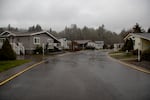
The Woodland East Community mobile home park in Woodland, Wash., on Jan. 31, 2025.
Erik Neumann / OPB
When Susan Zajac moved into the Royal Villas Mobile Home Park near Tigard three years ago, she thought she was making a good financial decision. She paid a mere $34,500 for her home and then rented the lot it sat on for $850 per month. Since then, her rent has steadily increased, to a current price of $1,200 per month.
Unlike many of her neighbors in the 55-and-older park, Zajac still works, but she says the increases from the park’s owner, Cal-Am Properties, are especially hard on her neighbors, many of whom are seniors on fixed incomes.
“It’s not the way it should be,” Zajac said.
She’s one of a growing number of tenants at manufactured home parks calling foul on park owners for what they say are exorbitant rent increases and unfair fees that are threatening to push tenants out of their homes altogether.
“It’s one of those situations where it seems like me and others buy in and kind of expect normal rent increases but not the exorbitant increases that have been happening,” she said.
Zajac was recently in Salem to support legislation aimed at protecting tenants like herself. The proposal, House Bill 3054, would cap rent increases for tenants in manufactured home parks and marinas at average cost increases as measured by the Consumer Price Index. Currently, rent increases cannot exceed 10% per year.
Other protections would cap the rent of someone who bought an existing mobile home in a park at 10% above what the seller was paying. Landlords would be restricted from requiring tenants to make aesthetic changes to their homes or to require home inspections when their manufactured home is being sold.
A similar fight is brewing in Olympia, where lawmakers recently introduced House Bill 1217. Termed a rent stabilization bill, the proposal would cap rent increases for all types of housing at 7% per year to provide “Washington renters with predictability, transparency, and the same protections afforded to other consumers.” It, too, specifically mentions manufactured homes.
The bills are two examples of ways to address the uniquely vulnerable position of residents in manufactured home parks. Unlike in apartments, people who own such homes but rent the land they’re on have less ability to leave if rental costs increase too quickly. Many are senior citizens living on fixed incomes, and steady rent increases cut against the value of their homes by making them less attractive if they wanted to sell.
Mobile home parks have also become a de facto source of low-income housing in places like Oregon, where housing production goals continue to lag and where building more homes is a key piece in addressing homelessness.
According to Clark County Assessor Peter Van Nortwick, manufactured home park residents, who are simultaneously renters and owners, are especially vulnerable to rising costs.
“They’re kind of getting hit double,” he said. “They will see increases in rents but they will also see decreases in the value of their manufactured home that’s sitting in the park.”
Arguments that rental rates should be left to the free market break down when tenants don’t have a choice of where to move, said Sen. Jeff Golden, D-Ashland, during recent testimony in support of HB 3054.
“As a practical matter, the tenants in these parks don’t have that choice,” Golden said. “The economics of moving a manufactured home to a theoretical competitor’s park keep tenants captive where they are as an economic matter.”
Both proposals in Oregon and Washington have been met with strong opposition from park owners, who say the legislation amounts to rent control and that it will have the opposite of its intended effect.
They argue that caps on rent increases will depress prices below market rates and force owners to run parks at the bare minimum standards so they fall into disrepair. During a committee hearing in Salem, opponents said the Oregon proposal would lead to more locally-owned parks being bought up by national conglomerates.
Jennifer Bagshaw owns a 180-unit manufactured home park in Medford. During testimony, she said the proposed Oregon legislation would have unintended consequences.
“My average increase per year for expenses is roughly 8%, and that is climbing steadily. As a small landlord, I rely on the flexibility to adjust rent for new tenants to cover these rising costs,” Bagshaw said. “Without the ability to adjust rents when homes turn over, these rising costs will become unmanageable, forcing small landlords like me to sell. The likely buyers will be real estate investment trusts, whose profit-driven practices are the ones causing this whole mess.”
The Washington and Oregon bills are in their early stages and have not yet been debated by the full legislatures, but supporters are hoping to keep the pressure on lawmakers. Washington’s chapter of the Association of Manufactured Home Owners is planning to rally with supporters for HB 1217 in Olympia on March 14.
Zajac, the renter in Portland’s southwest suburbs, said a recent town hall event at Royal Villas to discuss HB 3054 attracted 200 people to their park’s clubhouse, where they told visiting lawmakers their stories.
“Homelessness is a crisis that everyone doesn’t like. Everyone across the board,” Zajac said. “And it’s like, how do we solve it? Keep people in their homes.”
Correction: A previous version of this story misstated the amount that rent could be increased at manufactured home parks under HB 3054. OPB regrets the error.
